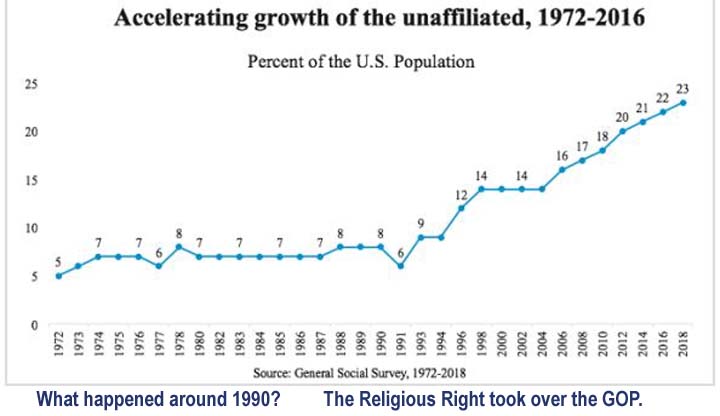
The Cellar: a friendly neighborhood coffee shop, with no coffee and no shop. Established 1990.
- xoxoxoBruce
- The Future is Unwritten
 Offline
Offline - Registered: 10/15/2020
- Posts: 4,340
Religions, So Many Variations
There are dozens, maybe hundreds of religions around the world.
But from what I've seen there is only a few "types".
The biggest "type" is the our guy had the straight dope from the almighty so we gotta do what he said or else.
But this "type" is split up into which guy the follow, then subdivided more times.
Those subdivisions range from lax except at their religious holidays, to real vehement assholes.
Because of this disparity I'm glad I found out how this happened.
Now you know.
Freedom is just another word for nothin' left to lose.
- xoxoxoBruce
- The Future is Unwritten
 Offline
Offline - Registered: 10/15/2020
- Posts: 4,340
Re: Religions, So Many Variations
Freedom is just another word for nothin' left to lose.
- •
- xoxoxoBruce
- The Future is Unwritten
 Offline
Offline - Registered: 10/15/2020
- Posts: 4,340
Re: Religions, So Many Variations
Unaffiliated goes right along with public behavior these day.
Religion was a big help in making people behave due to peer pressure.
People being naughty would try to be sneaky about it to avoid that pressure.
Now without that chance of tsk tsked by peers, they're being naughty in front of impressionable youth
and setting a very low bar for public behavior. 
Freedom is just another word for nothin' left to lose.
- •
- xoxoxoBruce
- The Future is Unwritten
 Offline
Offline - Registered: 10/15/2020
- Posts: 4,340
Re: Religions, So Many Variations
They estimate about 12,000 Gods have been venerated...





I noticed of the top ten Buddhist Gods, #2 is Buddha.?!?
Freedom is just another word for nothin' left to lose.
- •
- Happy Monkey
- Member
 Offline
Offline - From: DC
- Registered: 10/13/2020
- Posts: 494
Re: Religions, So Many Variations
I'm not sure what their "Godrank(tm)" technology is based on. "Lucifer" being the most popular Roman god implies it is just mentions, which would mean that stuff like mentions of the Tom Ellis TV show based on the Mike Carey comic based on the Gaiman comic based on folklore based on the Bible would count towards the Roman god of the morning star.
But Tithonus being ranked higher than Zeus breaks that theory. Who mentions Tithonus?
_______________
|_______________| We live in the nick of times.
| Len 17, Wid 3 |
|_______________|[pics]
- Anon
- Member
 Offline
Offline - Registered: 10/25/2021
- Posts: 452
Re: Religions, So Many Variations
Neither Gozer nor its minion Zuul show up in the top ten lists... bummer.
- griff
- A Magical Woodland Creature
 Offline
Offline - Registered: 10/13/2020
- Posts: 2,942
Re: Religions, So Many Variations
Mithras is still being suppressed at this late date, appalling.
If you would only recognize that life is hard, things would be so much easier for you. - Louis Brandeis
- griff
- A Magical Woodland Creature
 Offline
Offline - Registered: 10/13/2020
- Posts: 2,942
Re: Religions, So Many Variations
I wonder which gods are most venerated in the US?
Plutus: god of wealth?
Kratus: god of power?
Apate: goddess of deceit?
If you would only recognize that life is hard, things would be so much easier for you. - Louis Brandeis
- Diaphone Jim
- Not Ignoring You.
 Offline
Offline - Registered: 10/13/2020
- Posts: 1,311
Re: Religions, So Many Variations
McCluhan: God of TV
- tw
- Member
 Offline
Offline - Registered: 10/16/2020
- Posts: 1,510
Re: Religions, So Many Variations
Christian values have purged the archives of accurate facts. Missing in all lists is the #1 god - of sex.
- Anon
- Member
 Offline
Offline - Registered: 10/25/2021
- Posts: 452
Re: Religions, So Many Variations
griff wrote:
I wonder which gods are most venerated in the US?
Plutus: god of wealth?
Kratus: god of power?
Apate: goddess of deceit?
MAKE APATE GREAT AGAIN
- IC
- Member
 Offline
Offline - From: Left Field
- Registered: 12/03/2020
- Posts: 54
Re: Religions, So Many Variations
I can't figure out what your argument is supposed to be here.
Is it, "Because there are many false religions, it's impossible that there is a true one?" That doesn't seem right.
Is it, "The most popular belief system is bound to be the true one?" It's hard to see why that would make any sense.
But you list all kinds of different belief systems, including Atheism and agnosticism, as if we're supposed to deduce something from the mere existence of the list: but I'm unclear as to what the obvious conclusion is supposed to be.
Help me out here. What point, exactly, are you hoping that all this makes?
- IC
- Member
 Offline
Offline - From: Left Field
- Registered: 12/03/2020
- Posts: 54
Re: Religions, So Many Variations
IC wrote:
I can't figure out what your argument is supposed to be here.
Is it, "Because there are many false religions, it's impossible that there is a true one?" That doesn't seem right.
Is it, "The most popular belief system is bound to be the true one?" It's hard to see why that would make any sense.
But you list all kinds of different belief systems, including Atheism and agnosticism, as if we're supposed to deduce something from the mere existence of the list: but I'm unclear as to what the obvious conclusion is supposed to be.
Help me out here. What point, exactly, are you hoping that all this makes?
Hmmm...three days, and nobody can tell me what was meant by all those posts above? I'm still waiting for some kind of point or philosophical perspective to emerge from it all. Where is everybody? Somebody must have some idea what this thread was about...
- tw
- Member
 Offline
Offline - Registered: 10/16/2020
- Posts: 1,510
Re: Religions, So Many Variations
It was always this simple. Religion is a relationship between you are your god. Nobody else need know what that is - or cares. However your religion is never - not once at any time - imposed on anyone else. Otherwise religion is more than a relationship between one person and his god. A fundamental violation of all religions.
The original post is his religion. Nobody else cares. It is never imposed on anyone else.
- IC
- Member
 Offline
Offline - From: Left Field
- Registered: 12/03/2020
- Posts: 54
Re: Religions, So Many Variations
tw wrote:
It was always this simple. Religion is a relationship between you are your god. Nobody else need know what that is - or cares.
Thank you. You alone have had the courage to venture an answer to an obvious question. I appreciate the response.
That being said, I have to admit that I don't see how the above claim follows from any of the earlier posts. It would have to read something like:
1. People have believed in many gods, therefore, their choices are private.
or
2. Lots of people belong to different religions, therefore nobody needs to know what you are.
I don't see how that follows at all.
Can you make an argument for the proposition you suggest above, but backed with something that gives us reason to believe it? Nothing in the thread seems suitable to that purpose.
However your religion is never - not once at any time - imposed on anyone else.
Again, whether that's right or wrong, I can't see the logical connection with this thread.
Otherwise religion is more than a relationship between one person and his god. A fundamental violation of all religions.
Actually, it depends on the religion.
I think you're assuming, perhaps from a frame of reference that knows only pietistic or individualistic religions, typical of a Western experience, that all religions agree with this. But a great number do not. For example, Islam is not interested in your individual belief but rather your actual, practical submission to the larger construct of Islam itself. Or in China, in things like Confucianism or Taoism, and certainly in Communism (which is also a religion), a person who prioritizes his own private interests over the collective or community is actually considered a bad, selfish person, not a religiously moral one.
The original post is his religion. Nobody else cares. It is never imposed on anyone else.
That's certainly not true of Islam, or of any other such collectivist belief system.
However, consider the claim that we owe it to individuals to allow them their own god(s). Are you suggesting that it merely a belief you personally choose to hold, or something that you, I, and others are really essentially obligated to acknowledge, assuming we are good people? In other words, is it just a description of your own feelings, or a prescription of what is right for us all?
- tw
- Member
 Offline
Offline - Registered: 10/16/2020
- Posts: 1,510
Re: Religions, So Many Variations
The way I read the question is "What is the purpose of religion?" Which includes (what I consider to be) commandments that apply to all religions. One problem with some branches of Islam (and some extremist Christian religions) is a need to impose their beliefs on all others. The Mormons, for example, were (in some cases) victims of that hatred. And, of course, Jews.
That violates, what I regard as, the underlying principles that apply to all religions.
Early power (success) of religion was to provide basic rules that made possible a civil society. A set of rules so that all types of people could live and work together for the advancement of mankind.
One reason why Islam spread so powerfully back then even into Spain was the belief that other religions could co-exist. Jews prospered under Islamic rule during that period. All part of an underlying purpose: the advancement of mankind.
No matter what is a religion's god, its purpose remains (and maybe this contrary to what religions promoted) the advancement of mankind. Some religions may consider this contrary to putting their god above all else.
Last edited by tw (11/07/2024 3:52 pm)
- IC
- Member
 Offline
Offline - From: Left Field
- Registered: 12/03/2020
- Posts: 54
Re: Religions, So Many Variations
tw wrote:
The way I read the question is "What is the purpose of religion?" Which includes (what I consider to be) commandments that apply to all religions. One problem with some branches of Islam (and some extremist Christian religions) is a need to impose their beliefs on all others. The Mormons, for example, were (in some cases) victims of that hatred. And, of course, Jews.
This isn't really a very accurate historical view of what happened, I have to say. If you check, you'll find that the Mormons were alienated not from other religion in particular, but rather for a couple of other things: one was that they were considered treasonous (they were devotees of Joseph Smith, and held to single man rule: that was a key in Missouri, for example), and another was polygamy, which mutilple traditions and cultures reject.
As for the Jews, yes, Islam in particular, is anti-Semitic. But so were the Aryan occultist Hitler, and the avowedly Atheistic Stalin. In the US, antisemitism was a feature of the KKK wing of the Democrat Party, but more to do with race than anything. Religion didn't figure prominently in their calculations. They've never been a religion-centered political group.
That violates, what I regard as, the underlying principles that apply to all religions.
"What I regard..."? That's a phrase in need of justification, for sure. How seriously ought we to take the fact that one person "regards" that as the case? Surely not very seriously, if it's just a descriptive claim of what you personally happen to presently believe; but perhaps more seriously, and with much more support, if you're speaking prescriptively, aiming to say what they ought to believe.
So which is it? The question is necessary because, as I've pointed out, a great number of religions do NOT hold that that priniciple is right. What, then, proves to you that "all religions" are morally obligated to "apply" that "underlying priniciple" to their own religion? You're clearly speaking prescriptively here, saying that this is something they ought to do. But what authorizes your claim?
But there's an additional problem with that. If you speak prescriptively, meaning that you would compel what you "regard" to apply to religions like Islam, Taoism or Communism, you are "imposing your belief" on them. They don't believe it, obviously, but you are essentially saying they ought to, even if they do not. But if "imposing belief" is wrong, then would you not also be wrong to "impose" your "belief" that they ought not to "impose beliefs"? So that imperative seems to contradict itself: you can't assert it without thereby violating it at the same time, can you?
Early power (success) of religion was to provide basic rules that made possible a civil society. A set of rules so that all types of people could live and work together for the advancement of mankind.
That's the old globalist-Humanist metanarrative...the idea that mankind is the value-center of the universe, and that the teleology of human existence is the unification of "mankind." But that, itself, is a religious belief. It cannot be a scientific one, since science does not get into either prophecy or the declaring of what people "ought" to aim at. It satisfies itself with analyzing what is, what is testable, replicable, demonstrable. Only a religious, mystical or ideological perspective can venture into saying what the goal, end or rightful purposes of human existence might be.
One reason why Islam spread so powerfully back then even into Spain was the belief that other religions could co-exist. Jews prospered under Islamic rule during that period. All part of an underlying purpose: the advancement of mankind.
This is an expression of that same metanarrative, but now very carefully selected to privilege Islam in a way it does not deserve.
In Islam, Jews and Christians are considered "dhimmis," which means, essentially, second-class citizens whose property can be confiscated, whose women can be taken, whose children cannot be raised in their own tradition, and who must pay the "jizya" or tax on all their income. That is, in places where they were not, in keeping with the Koran, killed outright. That is, they are slaves.
You will find, historically, that Islam only became more seemingly-tolerant where its distance from Mecca was significant and where its power was proportionally weaker. In Spain, a more relaxed regime was possible precisely because of its remoteness from the conservative center of Islam. But what eventually destroyed the Andalusian Islam was actually the fragmentation of the Islamic Empire into "taifas" or factions. Ferdinand and Isabella finished it off in the end, but the romance of a land of tolerant Islamic scholarship in Spain was already long over by then.
No matter what is a religion's god, its purpose remains (and maybe this contrary to what religions promoted) the advancement of mankind.
Wait.
You're saying "some religions promoted" something "contrary" to what you say their "purpose" should have been? How is it you're able to tell these different religions what their real purpose should have been? And since most (aside from Western secular Humanism or Progressivism) do not believe that "the advancement of mankind" consists in the same things you think "advancement" might consist in, why are you telling them what they ought to believe? I thought you said that was bad?
- tw
- Member
 Offline
Offline - Registered: 10/16/2020
- Posts: 1,510
Re: Religions, So Many Variations
So many points. I will address one: race. Many in some "races" have more genetically in common with the other "race" than in their own people. Racism is not about genetics as so many only speculate. Racism is about hate of someone who is different. Many blacks have more in common with whites than those whites have in common with other whites. Color is not race. What language people speak is not race. Height is not race. Eye and hair color is not race.
Racism is only about first impressions. Nothing more.
Race and racism have nothing in common if one is thinking logically. Racism is judging others based only in first impressions. A decision only justified by emotions - not by intelligent thought.
And again, the difference between the brain of a child and the brain of an adult. Two completely different thought centers.
Does not matter that Mormons believe in an ultimate leader. If people where thinking logically. As long as their religion does not violate legitimate laws. Racism was hating Mormons because "(they were devotees of Joseph Smith, and held to single man rule: that was a key in Missouri".
Ironically Amish have a same religious belief. Why do we not hate Amish?
That should never have been a problem if others in Missouri were not trying to impose their religious beliefs on Mormons. Hate of Jews before and after WWII was another the classic example of one religion imposing their religion (emotions based in racism) on another genetically similar race. Only because the victim's religion was different. Classic racism. Hate of another only due to first impressions.
- IC
- Member
 Offline
Offline - From: Left Field
- Registered: 12/03/2020
- Posts: 54
Re: Religions, So Many Variations
tw wrote:
So many points. I will address one: race.
I'm sorry...I don't believe that concept, so I can't address it with you. I would suggest that there is but one "race," the human race. A little extra melanin or estrogen does not change that. Besides, I did not bring that concept into this discussion, and I don't think it has any relevance whatsoever to questions of "religion." So let's leave it out.
Does not matter that Mormons believe in an ultimate leader.
They don't, today, so far as I know. But they still revere Joseph Smith, and regard him as a prophet. However, that's a moot point, since it was for being treasonous, rather than for being religious or having a "race," that the Mormons were ejected from Missouri and elsewhere, and took themselves off to form their own colony. Their tendency to vote as a block gave them unprecedented political leverage, which they used to privilege their own, and this was resented; their odd belief that indigenous tribes were actually Israelites and their consequent interference with the tribes was also resented, and the rumour (largely unfounded) that they were "abolitionists" proved far more annoying to the old settlers than their general religious practices...polygamy being perhaps the most noteworthy exception. As you can see, there was a complex of reasons why the Mormons made themselves odious to the settlers, but their cultish behaviour was only one of several of these reasons.
As long as their religion does not violate legitimate laws.
Which "legitimate laws"? Islam has its own "laws," called "Sharia," which they regard as "legitimate," but are also both sexist and discriminatory against all "infidels." So when they behave accordingly, they are not "violating" their own Sharia. But they aren't following Western liberal laws, for sure. So which kind of "law" is the legitimate one, and why?
Ironically Amish have a same religious belief.
They don't. Sorry. They just don't. The only real similarity with Mormons is superficial, and is that they are cultural separatists, in that they prefer to establish their own colonies, rather than to integrate with modernity. But their beliefs are radically different from the Mormons; and today, the Mormons, unlike the Amish, are pretty integrated with modern American life.
Hate of Jews before and after WWII was another the classic example of one religion imposing their religion (emotions based in racism) on another genetically similar race.
Well, that's far too simplistic, I'm afraid. There are a variety of reasons people choose to be antisemitic. But a lot of them are not ostensibly "religious" in any way. For example, they are often envied for their prosperity or success, as a group...how is that "religious"? Or even more relevantly, one false accusation against the Jews has been that they are manipulating society through banking, entertainment, political manipulation or other elitist institutions, and thus are preventing Communism or milking society for their own gain or working to dominate the globe...that is the old "Protocols of the Elders of Zion" nonsense. And since that's probably the most famous slander against the Jews today, and has no religious basis at all, how is that a "religious" form of prejudice?
Only because the victim's religion was different. Classic racism.
Oh, I see...you're mixing up religious conflict with racist conflict.
No, those are very different. "Religion" often crosses the "racial" boundaries, in fact. For example, Arabs are Muslims, but so are many Slavs and Indonesians. There are black (Falasha) Jews, and Native Israelis, and white Jews. There are white, black, South American, Korean, Indian and Messianic (Jewish) Christians.
So we need to separate the two. One is not "racist" simply because one happens to disagree with another's "religion," anymore than one has to be "religious" to be a "racist." The two are not the same at all.
Last edited by IC (11/09/2024 11:25 am)
- tw
- Member
 Offline
Offline - Registered: 10/16/2020
- Posts: 1,510
Re: Religions, So Many Variations
IC wrote:
I'm sorry...I don't believe that concept, so I can't address it with you. I would suggest that there is but one "race," the human race.
Which is what I said. So you do not believe the concept but agree with it? The point is that racism is only about hate justified only by a first impression. If a man wears a shirt, racism condemns him. So many people have so much hate because someone might be transgender. And yet that is what many so called 'religious people' do. Impose their religious beliefs on all others. If god intended him to be transgender, then god would have born him that way. Religious extremism. Hate due to what all racism is based in. Judging people only on first impressions. Also called not thinking with a prefrontal cortex.
Religion is also based in faith. IOW I will order you what to believe. And then you have only faith to believe it. No facts. No justification. No consideration for all others. Just faith. Because, as your religious dictator, I order you what to believe. And you have faith.
That is also a violation of religions: a relationship only between a human and his god. To never be imposed on anyone else.
So many variations. Which religions are corrupt? Those that impose their beliefs on others.
- tw
- Member
 Offline
Offline - Registered: 10/16/2020
- Posts: 1,510
Re: Religions, So Many Variations
IC wrote:
So we need to separate the two. One is not "racist" simply because one happens to disagree with another's "religion," anymore than one has to be "religious" to be a "racist." The two are not the same at all.
Not grasped is what was written. Nobody said racist because one happens to disagree with another's religion. Where did that come from?
One is racist because one imposes his religious beliefs on other. But again, religion is only a relationship between one man and his god. Nobody's other religion has any relevance. 'Racism in religion' is when one's religion is more than just a relationship to his god. When his religion is imposed on others, then his religion is corrupt. The classic example of judging another only using first impressions.
- tw
- Member
 Offline
Offline - Registered: 10/16/2020
- Posts: 1,510
Re: Religions, So Many Variations
IC wrote:
Well, that's far too simplistic, I'm afraid. There are a variety of reasons people choose to be antisemitic.
They are not anti-other because some other group is also prosperous. Why not also be anti-another because other people in your religion are prosperous. The fundamental hate - racism - is because their religion (and how they live their lives) is not of your religion. Judgement only based in first impressions.
Why anti-semitic and not anti-another? Because the Jews are a different religion. Then any more reasons to hate are justified. Just another example of one's religious beliefs (or faith) imposed on another.
Again, nobody's religion should have relevance to yours. You religion must always be restricted to a relationship between you and your god. Nowhere else.
Even quoting the bible for political purposed makes one a religious racist. An extremist. Quotes from the Bible are never imposed on anyone else - if one is a good and truly religious person.
- IC
- Member
 Offline
Offline - From: Left Field
- Registered: 12/03/2020
- Posts: 54
Re: Religions, So Many Variations
tw wrote:
IC wrote:
I'm sorry...I don't believe that concept, so I can't address it with you. I would suggest that there is but one "race," the human race.
Which is what I said.
It isn't, actually. It may have been what you intended to say, but it clearly wasn't what you said.
So you do not believe the concept but agree with it?
Absolutely not.
Impose their religious beliefs on all others.
First, what do you mean by "impose"? Nobody's forcing anybody to do anything. Secondly, I have not the slightest idea of what "religion" has to do with either "race" or "transgenderism." So maybe you'd better explain that, too.
Religion is also based in faith. No facts. No justification.
Anybody who thinks that wouldn't be somebody who knows what faith is.
That is also a violation of religions: a relationship only between a human and his god. To never be imposed on anyone else.
As I pointed out: a lot of "religions" do not agree that this is any kind of "violation" of anything. And if you think they're wrong about that, you'd be "imposing" your own view on them, would you not?
- IC
- Member
 Offline
Offline - From: Left Field
- Registered: 12/03/2020
- Posts: 54
Re: Religions, So Many Variations
tw wrote:
IC wrote:
So we need to separate the two. One is not "racist" simply because one happens to disagree with another's "religion," anymore than one has to be "religious" to be a "racist." The two are not the same at all.
Not grasped is what was written. Nobody said racist because one happens to disagree with another's religion. Where did that come from?
From you. You were the one who added "race" to a discussion about "religion." I didn't.
One is racist because one imposes his religious beliefs on other.
This isn't correct at all. "Race" and "religion" are very obviously quite different issues.
- IC
- Member
 Offline
Offline - From: Left Field
- Registered: 12/03/2020
- Posts: 54
Re: Religions, So Many Variations
IC wrote:
tw wrote:
IC wrote:
Well, that's far too simplistic, I'm afraid. There are a variety of reasons people choose to be antisemitic.
They are not anti-other because some other group is also prosperous.
Yes, they are...at least in the case of the Jews, for sure. But you can also see it in other cases. It's actually very common for people to use envy as an excuse to hate a subgroup.
Again, nobody's religion should have relevance to yours.
Says who, and on what grounds?
 1
1 